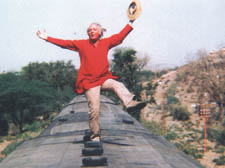|
|
 |
| |

Filming Gandhi, 1981: ‘Suddenly the ominous rumbling in my bowels disappeared. I stood up and did a little dance’ |
A passionate champion of the politically heroic
...but Sir Richard Attenborough didn’t always choose heroes wisely, writes Illtyd Harrington
ENTIRELY UP TO YOU, DARLING.
By Richard Attenborough and Diana Hawkins.
Hutchinson £20.
ENTIRELY up to you, like Marmite. But love him or loathe him, at 85, Richard Attenborough remains an extraordinary man.
Actor, film director and producer, philanthropist, Labour life peer, even president of Chelsea Football Club and former confidant of Princess Diana, he has come a long way since 1942 when he played a boy stoker in Noel Coward’s war film about a destroyer In Which We Serve.
In his latest book, Entirely Up to You, Darling, he and Diana Hawkins, a close associate for 50 years, tell in spliced interlocked narrative their story. It begins with his 20-year struggle to film the life of Gandhi, which culminated in 11 nominations and eight Oscars at the 1982 Academy Awards. His tenacity over this enormous project says it all: to its deep chagrin, Hollywood refused to invest a single brown cent.
His strong social conscience seems to have been nurtured by his father and mother, who took two German Jewish refugees, Irenie and Helga, into their Leicestershire home. They became sisters to the three Attenborough boys, Richard, David and John.
He is proud of his mother’s support for Republican Spain in 1936 and her alliance with Communist activists. His anti-racist credentials are admirable and his passion, put into his film Cry Freedom – the story of political refugee, white editor Donald Wood, and the murdered black activist Steve Biko – was a resounding blast against Apartheid, putting the film company into acute personal danger. BOSS, the South African secret service, was given carte blanche to rub out significant opponents. The account of the filming in Zambia is a tense, fearful scenario, revealing how the ruthless hand of racialism even saw an attempt at having him beaten up in a urinal in a filling station.
An audience with president Ronald Reagan in the Oval Office left him bemused by the mental obstruction of the most powerful man in the world – clearly well on his way down the path of Alzheimer’s. Ronald Reagan had earned Attenborough’s contempt for his role as a witch hunter in Hollywood, where among his intended victims was Edward G Robinson, the doyenne of cinema’s hard men. Robinson remained a friend and fellow art collector thereafter.
Attenborough was certainly naïve, when coming face to face with the likes of Mother Theresa or Indira Gandhi – he even called Thatcher a darling – although the truly admirable Mandela swept him off his feet.
To him, it is not wrong to hero-worship and he longs, even in great old age, to film the life of Tom Paine, that radical giant of the turbulent 18th century, honorary citizen of the new United States and revolutionary France – the author of the The Rights of Man. In Attenborough’s pantheon, Gandhi, Paine and Mandela get pride of place.
At the pinnacle of fame and recognition, tragedy struck with a cruel and unexpected savagery. His daughter and granddaughter were killed in the Asian tsunami on Boxing Day, 2004. Another granddaughter was seriously injured.
A man often derided for his free-flowing tears, his grief must have been terrible as his family reeled under those terrible blows.
The trumps and triumphs, the tumults, treachery, tragedy and tears envelop this gnomic, irrepressible man – and his race is not yet run.
 |
 |
|
 |
 |
|
 |
|



